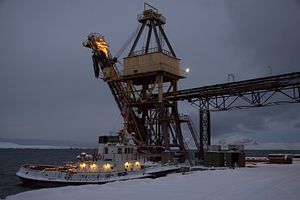China, the world’s largest trader and second largest economy, has in recent years increased its outward investments and is dependent on international trade for its energy and food security. It should therefore come as no surprise that Chinese companies are looking for new growth opportunities in the Arctic, one of the world’s most resource-rich regions. The Arctic holds as much as 20 percent of Earth’s remaining natural resources, including energy (renewables and fossil fuels), minerals, fresh water and seafood; it also plays an important role in international transport networks, with the vast majority of global trade taking place in the Northern Hemisphere.
The Arctic can offer diverse opportunities with a potential marriage of resource utilization in the North and rising buying power in the East playing a key role. Some Arctic projects will take time and deep pockets to develop. It is hard to see who other than Chinese companies currently has the stamina to wait up to 10 years for investments to yield profits. Moreover, China, like other great powers in history, such as the United States and the United Kingdom, has established itself as a proponent for free trade and of freedom of navigation.
Historically, the relationship between Europe and the Arctic has been strong. The pioneers of Arctic exploration came from Europe and trade, ever since the Viking era, has been very active. This may now be changing, for several reasons. The biggest factor could be advances in transportation, where costs have been coming down tremendously, opening up new markets for resources and shifting world economic growth away from Europe. Demographics are a very strong indicator of future growth. Around 1950, Europe had roughly half a billion people, the U.S. had 150 million, and the world 2.5 billion. Today, Europe is more or less unchanged, the U.S. has doubled, and the world tripled. This trend is continuing and is diminishing the role of Europe in world markets.
With large differences in growth rates between continents, significant changes are taking place in international markets. China has now become the largest player in international trade, surpassing the U.S. and the European Union. Between 2006 and 2010 China ratified five bilateral Free Trade Agreements (FTAs), with Chile, Peru, Pakistan, Singapore and New Zealand; by 2013 China, had become the main trading partner to the majority and top three to all of these countries. It is understandable that Iceland made considerable efforts to finalize an FTA with China, becoming the first European (and Arctic) state to do so. Trade between the two countries has great potential in the future. Since then, both Switzerland and Australia have followed suit and signed FTAs with China.
The difference in growth rates between the world’s two largest economies, China (7 percent) and the United States (2.5 percent), could make China the world’s largest economy within the next decade. China was roughly half the size of the U.S. economy in 2012, but will probably outgrow the U.S. in 2023. China is much more sensitive than the U.S. to international trade. The two economies are on very different paths. China is becoming more and more open, while the U.S., on its way to becoming energy independent, will not have to rely as much on international trade. For instance the increase in fuel imports in China amounts to over 10 percent per year, while the U.S. has been reducing the amount of its energy imports by 8 percent per year, on average, in the last few years.
If there were an international backlash against either the U.S. or China it is very clear which economy would suffer more: China, being so dependent on imports, would probably face a deep depression while the U.S. would only experience a standard economic contraction. The popular view that China is so strong and independent and therefore can behave any way it likes internationally is simply false. The EU and the U.S. are much more self-sufficient than China, particularly the U.S.
The current unrest in commodity markets could influence these developments. What is important is to look beyond these cyclical movements and mood swings in the market and see a few decades ahead. Financial markets are volatile in the short term but it is interesting to note that the 10-year price of oil, in those same markets, is more or less unchanged even though prices have been cut in half within the last year. The trend in the long term in regard to world population and increasing prosperity is clear. This means that unless there is a tremendous technological advance, demand for energy will increase and so will demand for commodities in general.
This is why China has looked towards new growth opportunities in the Arctic area. The claim that there has to be political agenda behind any Chinese involvement in the Arctic’s economic development ignores the fact that it makes sense from a business perspective to engage in cooperation with local partners in developing Arctic infrastructure, transport, resources and services.
In the Arctic, as elsewhere, it is up to the local authorities and inhabitants to decide how, and whether, to do business with Chinese companies. With China taking over as the world’s largest economy we can only expect Chinese companies to increase their participation in international business. This will particularly be the case when Chinese companies and their international partners enjoy mutual benefits and are complementary to each other, as is often the case with Arctic projects. China and some other Asian economies, with their large populations and rising buying power, will therefore play an important role in developing the Arctic economy, especially with the EU still in stagnation and the U.S. (excluding Alaska) showing limited interest in long-term Arctic investment projects.
Heidar Gudjonsson is Chairman of Eykon Energy and Vodafone Iceland. Egill Thor Nielsson is Executive Secretary of the China-Nordic Arctic Research Center and Visiting Scholar at the Polar Research Institute of China. Opinions are their own.

































